

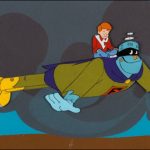
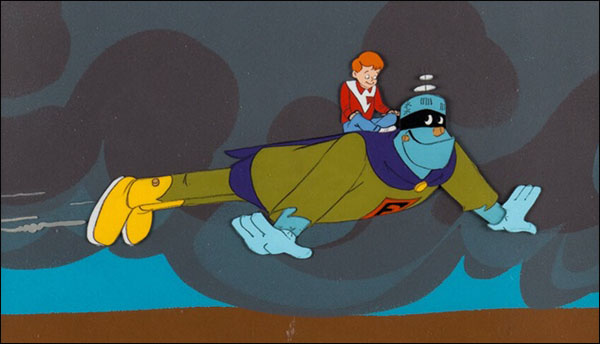
“Not Super. Not Heroes. Not Giving Up.” So declares the movie poster for Thunderbolts* Marvel Studios’ latest movie that debuts in theaters this weekend.
A different entry in the blockbuster franchise, as this one centers on a team of antiheroes who don’t fit the superhero mold and are forced to work together.
As any animation fan and devotee of classic Saturday morning TV knows, this model is nothing new. The 60s and 70s television landscape on Saturdays was filled with superheroes who were decidedly different but definitely memorable.
In honor of Thunderbolts* hitting theaters, here’s a look back at just a few of them:
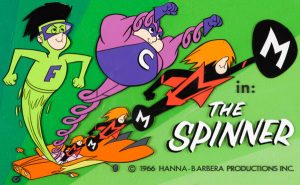 Frankenstein Jr. and The Impossibles (CBS, 1966)
Frankenstein Jr. and The Impossibles (CBS, 1966)
This series was a “best of” when it came to Hanna-Barbera of the era, as it was written by Michael Maltese, Jack Hanrahan, Eddie Brandt, and Phil Hahn, who all brought their sharp skills for humor, here merging them into an original superhero format.
The show was divided into two separate sections each week: one centered on a young boy scientist named Buzz Conroy (the voice of Dick Beals) who fought crime with the aide of Frankenstein, Jr. (the familiar, booming voice of Ted Cassidy), a giant robot resembling the famous monster.
The other part of the show focused on The Impossibles, a trio of superheroes. They were Multi-Man (Don Messick), who had the power of duplication; Coil Man (Hal Smith), who could “spring” into action; and Fluid Man (Paul Frees), who could easily turn himself to water.
Adding to the oh-so-60s flavor of the series, The Impossibles were also a music group. Frankenstein Jr. and The Impossibles was quite the original production from a period of Hanna-Barbera’s superhero shows and are remembered fondly by many.
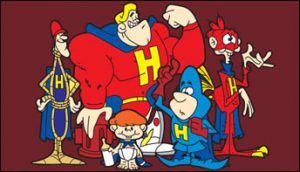 The Mighty Heroes (CBS, 1966)
The Mighty Heroes (CBS, 1966)
When Ralph Bakshi worked for Terrytoons, he created this off-kilter Avengers-like team-up of unlikely superheroes with the oddest of powers.
The Mighty Heroes were Strong Man, whose power is explained in his name; Diaper Man, a gruff-Baby-Herman-like infant who would wield his bottle as a weapon; Tornado Man, the secret identity of a TV meteorologist who could turn himself into a twister; Rope Man, a sailor who could transform himself into an endless supply of rope and Cuckoo Man, the alter-ego of a bird shop owner.
Two talented actors voiced the heroes: Herschel Bernardi (Strong Man, Diaper Man, and Tornado Man) and Lionel Wilson (Cuckoo Man and Rope Man).
With unique character design, style, and memorable theme music, The Mighty Heroes, which only lasted 21 episodes, was both a send-up and a love letter to superheroes.
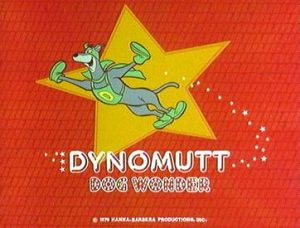 Dynomutt, Dog Wonder (ABC, 1976)
Dynomutt, Dog Wonder (ABC, 1976)
This series debuted as part of the Scooby-Doo/Dynomutt Hour. The sidekick to the oh-so-serious Blue Falcon (voiced by Gary Owens, who, of course, had also lent his iconic voice to Hanna-Barbera’s Space Ghost), Dynomutt (animation voice legend Frank Welker) was a robotic dog with a number of electronic and hydronic abilities, most of which malfunction. However, the duo always manage to capture the villain.
Created by Joe Ruby and Ken Spears, the series combined shades of Batman (Blue Falcon’s true identity was the Bruce Wayne-like millionaire Radley Crown) deftly with creative cartoon character humor (Dynomutt simply refers to his superhero boss as “B.F.”).
Dynomutt, Dog Wonder has emerged one of the most memorable of Hanna-Barbera’s shows of the 70’s.
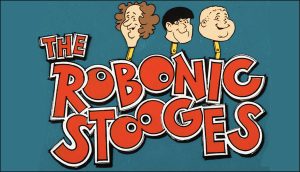 The Robonic Stooges (CBS, 1977)
The Robonic Stooges (CBS, 1977)
Did you ever wonder what The Three Stooges would be like as superheroes? Wonder no more, thanks to this Hanna-Barbera cartoon that originally aired as a segment of the studio’s live-action Skatebirds show.
The series was developed by Norman Maurer, a writer, producer, and director who had a long-time association with The Three Stooges that dated back to the 1940s. In this animated iteration, Moe (voiced by Paul Winchell), Larry (Joe Baker), and Curly (Frank Welker) own a junkyard and work for the Superhero Employment Agency.
The Stooges would help thwart a villain in each episode through their bionic powers. As they were The Robonic Stooges, however, their powers would often fail, but the bad guy would meet their defeat with a good dose of Three Stooges slapstick.
The Super Globetrotters (NBC, 1979)
This was Hanna-Barbera’s sequel of sorts to the 1970 series that featured The Harlem Globetrotters in animation; this time, the basketball players were also superheroes, with many of their powers re-booted from The Impossibles.
While still playing as The Harlem Globetrotters, the team also worked undercover as superheroes: Nate Branch was Liquid Man and could transform into water, “Curly” Neal was Super Sphere, and his head could transform into a giant basketball, “Twiggy” Sanders was Spaghetti Man, transitioning into rope, “Sweet Lou” Dunbar was Gizmo, whose hair contained an endless supply of gadgets, and “Geese” Ausbie was Multi-Man and could clone himself.
This super version of The Globetrotters only lasted for thirteen episodes. It was eventually combined with another star of Saturday morning at the time, as the eclectic series The Godzilla/Globetrotters Adventure Hour.
Mighty Man and Yukk (ABC, 1980)
When Joe Ruby and Ken Spears formed their own studio (aptly named Ruby-Spears Enterprises), one of their cartoons that aired as part of The Plastic Man Comedy/Adventure Show was this most bizarre superhero team-up.
Mighty Man (Peter Cullen) was an eccentric billionaire who used a machine to shrink himself down to a few inches tall while still being equipped with superpowers.
His sidekick was Yukk (Frank Welker), “the world’s ugliest dog,” who had to hide his face inside a miniature doghouse he wore on his head. Yukk’s superpower was that when he showed his face to bad guys, they ran away.
There was only a half-season of Mighty Man and Yukk, and while the show may be gone, it’s not forgotten by many Saturday morning TV Fans for its bonkers premise.
There were plenty more of these decidedly different heroes airing in the wee hours of the weekends as kids consumed sweetened cereals, during an era long before summer blockbuster franchises, when Saturdays were truly super.